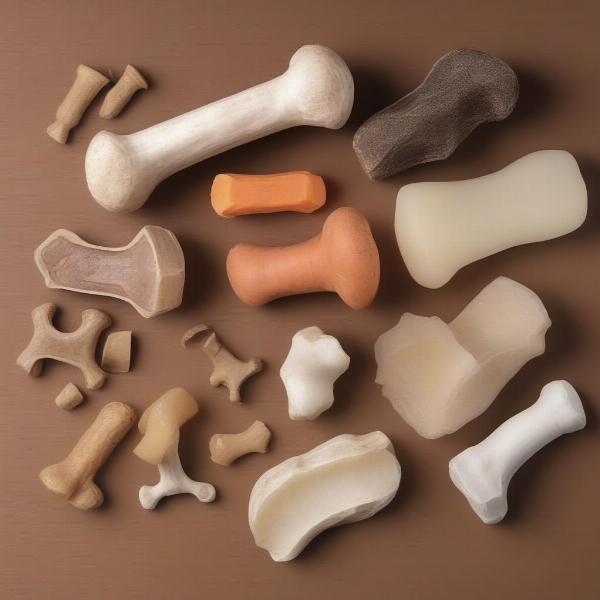Dog bones are a popular treat for our canine companions, but navigating the world of dog bones can be confusing. With so many options available, it’s crucial to understand which bones are safe, beneficial, and appropriate for your furry friend. This guide will explore the different types of dog bones, their benefits and risks, and how to choose the right one for your dog’s size, age, and chewing habits.
Types of Dog Bones
There are several types of dog bones on the market, each with its own set of characteristics:
-
Natural Bones: These bones, often sourced from cows or buffalo, are typically roasted or smoked. They can be a good source of minerals and help satisfy a dog’s natural chewing instinct. However, some natural bones can splinter, posing a choking hazard or causing digestive issues. Always supervise your dog when they are enjoying a natural bone.
-
Manufactured Bones: These bones are often made from nylon, plastic, or rubber. They are designed to be more durable than natural bones and are less likely to splinter. Many manufactured bones come in different flavors and textures to keep your dog entertained. However, some dogs can chew off pieces of these bones and ingest them, which can cause blockages.
-
Edible Bones: These bones are designed to be fully digestible and are often made from ingredients like rawhide, sweet potato, or rice. They can be a good option for dogs who are prone to digestive upset or who tend to swallow large pieces of bone. However, some edible bones can be high in calories, so it’s essential to monitor your dog’s intake.
 Different Types of Dog Bones
Different Types of Dog Bones
Benefits of Dog Bones
Chewing on a dog bone can provide several benefits for your furry friend:
- Dental Health: Chewing can help scrape away plaque and tartar buildup, promoting good oral hygiene. This can help prevent gum disease and bad breath.
- Mental Stimulation: Chewing can help relieve boredom and stress, preventing destructive behaviors like chewing on furniture or excessive barking.
- Jaw Strength: Chewing exercises the jaw muscles, keeping them strong and healthy.
Risks of Dog Bones
While dog bones can offer benefits, it’s crucial to be aware of the potential risks:
- Choking Hazard: Bones, especially natural bones, can splinter and become lodged in your dog’s throat, causing choking.
- Digestive Issues: Swallowing large pieces of bone can cause blockages in the digestive tract, leading to vomiting, diarrhea, and potentially requiring surgery.
- Dental Damage: Extremely hard bones can chip or fracture a dog’s teeth.
Choosing the Right Bone for Your Dog
Selecting the right dog bone involves considering your dog’s size, age, and chewing habits:
- Size: Choose a bone that is appropriately sized for your dog. Small dogs should have small bones to prevent choking hazards.
- Age: Puppies and senior dogs often have more sensitive teeth and gums and may benefit from softer, more digestible bones. peanut butter filled dog bones are a popular choice for many dogs.
- Chewing Habits: Aggressive chewers require extremely durable bones that won’t splinter or break easily. Consider hartz dog bones for these powerful chewers.
What are the best dog bones for aggressive chewers?
For aggressive chewers, durable nylon or rubber bones are often recommended. Look for bones specifically designed for “power chewers” to ensure they can withstand vigorous chewing. small dog bones should be chosen for smaller breeds, even aggressive chewers, to prevent choking hazards.
Conclusion
Dog bones can be a valuable addition to your dog’s routine, providing dental, mental, and physical benefits. However, careful selection and supervision are crucial to ensuring your dog’s safety and well-being. By understanding the different types of dog bones, their benefits and risks, and how to choose the right bone for your individual dog, you can help your furry friend enjoy this popular treat safely. dog bones with peanut butter are another delicious option to consider.
FAQ
- Are cooked bones safe for dogs? No, cooked bones can easily splinter and cause serious internal damage.
- How often should I give my dog a bone? Treats, including bones, should only make up a small portion of your dog’s daily caloric intake. Consult with your veterinarian for personalized recommendations.
- What should I do if my dog swallows a large piece of bone? Contact your veterinarian immediately.
- Can puppies have bones? Yes, but choose soft, puppy-specific bones that are designed to be gentle on their developing teeth and gums. ham dog bones are another option for some dogs.
- Are rawhide bones safe? While generally considered safe, some dogs can have difficulty digesting rawhide. Monitor your dog closely and choose high-quality rawhide products.
- What are some alternatives to traditional dog bones? Chew toys, dental chews, and frozen carrots or Kongs filled with treats can offer similar benefits to dog bones.
- How do I clean dog bones? Wash durable bones with soap and water. Discard natural bones after your dog has finished chewing them.
ILM Dog is your trusted source for expert advice on all aspects of dog care and well-being. We offer valuable information on dog breeds, health, training, nutrition, grooming, and much more. From puppy care to senior dog needs, we are here to help you provide the best possible care for your beloved companion. Contact us at [email protected] or +44 20-3965-8624 for personalized guidance. ILM Dog is dedicated to providing the latest information and resources for dog owners worldwide.